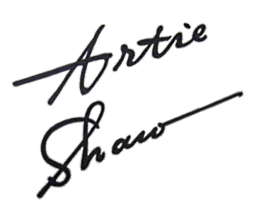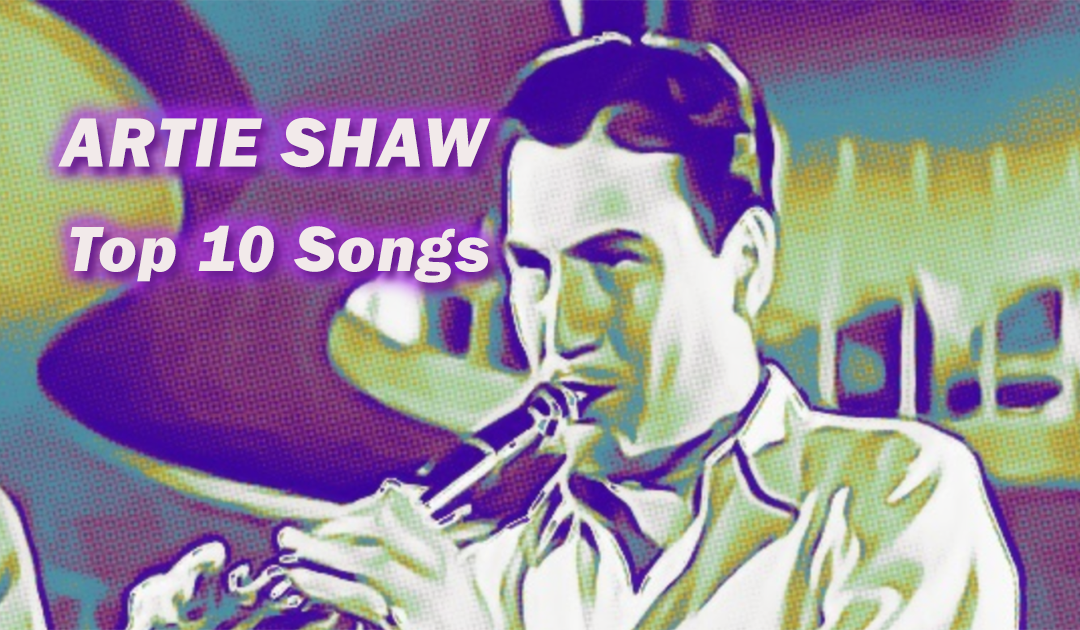Top Ten Artie Shaw Songs
Based on total number of plays from Spotify, Amazon, YouTube, Apple, and LastFM
- Begin the Beguine
- Moonglow
- Frenesi
- The Chant
- Nightmare
- Stardust
- Any Old Time
- Softly, as in a Morning Sunrise
- All the Things You Are
- Concerto for Clarinet
Begin the Beguine
A version of ‘Begin the Beguine’ written by Cole Porter and arranged by Artie Shaw is the song that launched Artie Shaw to stardom in the fall of 1938. Porter composed the song in 1935 while onboard a cruise ship in the South Pacific between Fiji and Indonesia. The RCA recording of the song was issued by Bluebird Records in 1938 and would become one of the most famous and popular songs of the entire Swing Era. Learn more about ‘Begin the Beguine’.
Q: What is a beguine?
A: A beguine is a popular dance of West Indian origin, similar to the foxtrot that was popular in the 1930’s.
Moonglow
Moonglow is a classic Jazz Standard. Performed as an instrumental by Artie Shaw and his Orchestra in 1941. The song was composed by Will Hudson and has been recorded by numerous musicians, including Benny Goodman, Duke Ellington, and Cab Calloway. The song can also be heard in movie director Martin Scorsese’s 2004 film ‘The Aviator’ in a scene where Howard Hughes (played by Leonardo DiCaprio) and Katharine Hepburn (played by Cate Blanchett) fly over Los Angeles at night in one of Hughes’ private planes. In the 1961 Season 3 / Episode 8 of The Twilight Zone titled “It’s a Good Life”, 6-year-old Anthony Fremont enjoys hearing “Moonglow” played on the piano during a surprise birthday party for an ill-fated neighbor. Learn more about ‘Moonglow’.
Q: Who first wrote Moonglow?
A: Moonglow was written by Eddie DeLange, Will Hudson and Irving Mills in the early 1930’s and was first performed by Valaida Snow & Dee Lloyd McKaye. Valaida was also known as ‘Queen of the Trumpet’ and Louis Armstrong once referred to her as the world’s second best trumpet player, after himself, and she had the nickname “Little Louis”.
Frenesi
A version of Frenesi recorded by Artie Shaw and His Orchestra reached number one on the Billboard pop chart on December 21, 1940 and stayed #1 for 13 weeks. In 1982 Frenesi was inducted into the Grammy Hall of Fame. A few other performers who recorded the song include Woody Herman, Glen Miller, Harry James, and Natalie Cole. The Artie Shaw recording was used in the soundtrack of the 1980 film Raging Bull directed by Martin Scorsese. Learn more about ‘Frenesi’.
Q: What does frenesi mean?
A: Frenesi is the Spanish word for ‘frenzy’, temporary madness or wild behavior.
The Chant
‘The Chant’ was recorded from a CBS Melody and Madness radio broadcast on March 12, 1939. The song was originally called ‘Ubangi’ and was created by Artie shortly after forming Shaw’s New Music band sometime in the spring of 1937. It’s often been said that elements of traditional Jewish Klezmer music which was played at weddings and other joyous social events can be heard interwoven into the song, which Artie said later in interviews was ridiculous. Listen for Buddie Rich picking up the tempo of his drums towards the end, which thrilled audiences. Learn more about ‘The Chant’.
Q: According to Artie Shaw, what was the reason for there being music on the radio?
Nightmare
The song ‘Nightmare’ was composed by big band leader and swing era clarinetist Artie Shaw in 1936 before being released by Artie Shaw and His Orchestra in 1938. CBS radio network. Shaw was told that he needed to create a theme song to play at the beginning and end of his band’s live CBS radio broadcasts in New York City. Written in a minor key, the darker, serious sound and feel of ‘Nighmare’ was very different then other bands’ theme songs and got a lot of attention which served the band well. It’s been said that ‘Nightmare’ was the inspiration fo the “James Bond Theme” written by composer John Barry. Learn more abouut ‘Nightmare’.
Q: Who wrote 'Nightmare' by Artie Shaw?
A: Trick question. Artie Shaw wrote ‘Nightmare’.
Stardust
Stardust is now a Jazz Standard that was composed by American singer, songwriter and musician Hoagy Carmichael. In 1927 after leaving a college hangout at Indiana University Carmichael started whistling the tune that would become ‘Stardust’ in response to a recent breakup with a girlfriend. Mills Music hired Carmichael to write songs in 1928 and had words added by lyricist Mitchell Parish. The song became popular on the radio and was a standard by 1940. Artie Shaw’s rendition of the song released by RCA sold became the most popular and sold over a million copies. Stardust was featured in several films, including My Favorite Year, Goodfellas, Sleepless in Seattle, and Casino. It was inducted into the Grammy Hall of Fame in 1995. Learn more about ‘Star Dust’.
Q: Who composed Stardust?
A: Hoagy Carmichael in 1927
Any Old Time
Artie Shaw wrote the words and music to ‘Any Old Time’ which was sung by Billie Holiday on the Bluebird label during her time with Artie Shaw’s band. Billie Holiday’s time with the Art Shaw band was short-lived because she was under contract to the Brunswick record label. Later, Shaw recorded the tune with vocalist Helen Forrest. Learn more about ‘Any Old Time’.
Lyrics:
Any old time you want me
I am yours for the asking darling
Any old time you need me
I’ll be their with love that’s lasting darling.
All through the years well stand together
Sharing the tears and stormy weather
And the sunshine will be yours and mine
Any old time you’re blue
You’ll have our love to chase away the blues
And any old thing you do I’ll see you through.
So just remember that I am waiting dear
If ever you want me I’ll be near,
Any old time and any place you may be.
Q: Who wrote 'Any Old Time'?
A: Jimmie Rodgers wrote “Any Old Time’ on Februrary 21, 1929, in New York City. Rogers, who had a yodler style to his singing, is considered by many to be “the Father of Country Music”. Tragically, the musician died from tuberculosis at the age of 35.
Softly, As in a Morning Sunrise
Originally composed as a tango, ‘Softly, As in a Morning Sunrise’ is a song with music by Sigmund Romberg and Oscar Hammerstein II from the 1928 operetta The New Moon which was a Broadway hit. The song was featured twice in MGM’s movie about Sigmund Romberg, titled ‘Deep in My Heart’. Artie Shaw helped to make the song popular with the recording of his 1938 jazz rendition. The song is now considered to be a Jazz Standard. Learn more about ‘Softly, As in a Morning Sunrise‘.
Q: What type of jazz is Softly as in a Morning Sunrise?
A: ‘Softly as in a Morning Sunrise’ was originally written as a tango, however, many variations of the tune have been performed. The song is a Jazz Standard that is most commonly played in the key of C minor.
All the Things You Are
‘All the Things You Are’ is a song by Jerome Kern with lyrics written by Oscar Hammerstein II that was created in 1939 for the musical ‘Very Warm for May’. A popular version of the song was recorded by Artie Shaw and His Orchestra with vocals by “the girl singer”, Helen Forrest who became known as “the voice of the name bands.” This 1930’s Jazz Standard was also perfomed by Tommy Dorsey, Charlie Parker, Dizzy Gillespie, and Chet Baker. Learn more about ‘All the Things You Are’
Q: How was Artie Shaw connected to the song writer behind 'All The Things You Are'?
A: For about a the year famous American song writer Jerome Kern was Artie Shaw’s father-in-law, as Betty Kern, the daughter of Jerome, was Artie’s fourth wife from 1942-1943. All in all, Artie Shaw had eight wives.
Concerto for Clarinet
‘Concerto for Clarinet’ is a boogie-woogie blues composition for clarinet and jazz orchestra by Artie Shaw. The piece ends with a “legendary” altissimo C. Artie Shaw and His Orchestra performed the piece in the 1940 musical-comedy ‘Second Chorus’ starring Fred Astaire, Paulette Goddard, and Burgess Meredith. In the movie, Artie Shaw plays himself, and persuades Ellen to be his booking manager.
In 1955 Harry James also recorded a version of ‘Concerto for Clarinet’ on album ‘Jazz Session’. Learn more about ‘Concerto for Clarinet‘.
Q: What clarinet did Artie Shaw play?
A: Artie Shaw played a large-bore Selmer BT six-ring model with articulated G-sharp key with the big band saying that “it has more ‘shout'” . He briefly played a Conn before switching to a Buffet with the Gramercy 5 in 1953 saying that “it’s more ‘intimate'”.
The Best of Artie Shaw
This was the title of an RCA 1975 compilation of Shaw’s songs that included:
Four Star Favorites by Artie Shaw
This compilation album by RCA was ranked #6 in the list of Top Ten Albums for 1943. The included songs are:
Artie Shaw Greatest Hits
A 1996 RCA Victor compilation of 14 of Artie Shaw’s most popular songs includes:
Begging for More?
If this Top 10 List has left you begging for more great Artie Shaw tunes, then you’re in luck. Just click on over to the list of Artie Shaw singles like no other…

